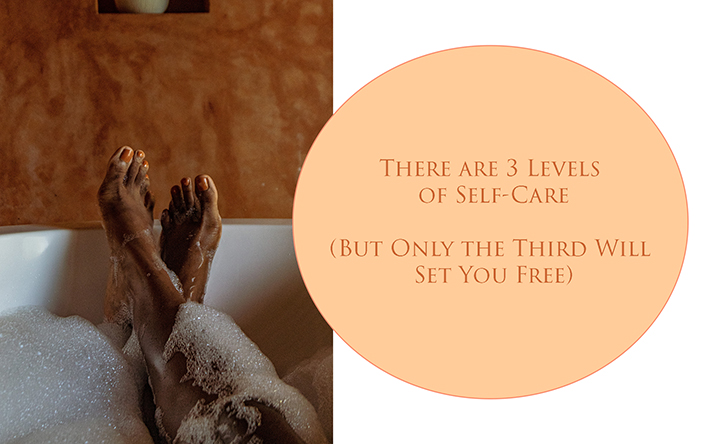There are 3 Levels of Self-Care: Superficial, Personal, and Transcendent.
The most basic level is superficial self-care, and being the surface level, it focuses on appearance.
The next level is personal self-care, which includes everything you do to support your physical and mental health in everyday life.
And the deepest level of Self-care is transcendent.
All 3 levels of self-care have their benefits.
But your level of consciousness can drastically change the results you experience.
And this is the key to changing your level of self-care.
This article breaks down the first two levels of self-care —what they are, examples, benefits, and drawbacks,— and then discusses why only the deepest level of Self-care can truly transform your life.
Superficial Self-Care
Superficial self-care is what you do to make yourself look good.
This is when you get your hair done, indulge in a facial, or schedule regular manicures so that other people will respond to you more favorably.
And there’s nothing wrong with any of these activities.
I’m definitely not going to tell you that you should let your hair grow to your knees and never look in a mirror again!
But there’s reason to be cautious around superficial self-care.
Because there’s a huge difference between doing something to gain approval from others and doing something to genuinely support your wellbeing.
On the plus side, any time-out from the usual hustle and bustle of life can activate your parasympathetic nervous system, which helps you turn down your body’s stress response.
And all levels of self-care can do this, even the most superficial level.
But when self-care is only used to help you look good, it’s an approach that keeps you stuck in a cycle of suffering.
Because when you’re focused on other people’s opinions of you, your wellbeing is dependent on circumstances that are entirely outside of your control.
You can try to manipulate the way other people receive you by catering to what you think they might expect or admire.
But in reality, the way other people see you has more to do with them than it does with you.
Every single person you come in contact with comes with their own history and conditioning.
And this means that every single person will have a unique response to the way in which you present yourself.
What pleases one is a total turn-off for another, whether or not they admit it to the crowd.
So no matter how hard you try, no matter how toned you are, no matter how many facials you get, no matter how long your eyelashes are, you can never please everyone.
And you definitely can’t change what people think.
Some might admire your appearance for a moment, sure.
You may even inspire jealousy, if that’s what you’re going for.
But you can’t trick people into liking you.
And the more you chase after those likes, both virtually and in person, the less satisfied you’ll be with yourself.
Enter personal self-care.
Personal Self-Care
Personal self-care includes all of the things you do that support your physical and mental health.
When we talk about personal self-care we’re talking about nutrition, exercise, therapy, massage, forest bathing, bubble baths, journaling, reading, and on and on.
Basically, whatever it is that supports your basic needs, calms your nervous system, and helps you grow as a human being can be classified as personal self-care.
If you intentionally engage in some sort of personal self-care every day, you’re doing 1000x more for yourself and the world than the vast majority of humans.
But personal self-care is still limited because it’s ego-based.
Just like with superficial self-care, you’re trying to change the way you show up in the world in hopes of a desired result.
It might be your own approval you’re chasing after this time instead of other peoples’, but you’re still chasing.
And this means that even if you build your whole life around personal self-care, you will still feel a sense of longing, incompleteness, and dissatisfaction.
That is, until you start to practice transcendent self-care.
Transcendent Self-Care
Transcendent self-care might look similar to personal self-care at a glance, but in reality it goes so far beyond the other forms of self-care that it could be in its own category.
Because transcendent self-care is really capital “S” Self-care.
And it’s nothing short of embodying the divine.
Transcendent self-care isn’t about what is happening to you (as the ego), but about actually BEing you.
It’s the witnessing of Life-Force itself.
And it includes any practice that brings you more fully into the Truth of the present moment.
Examples include meditation, mindful movement, self-inquiry, pranayama, energy work, and other intuitive practices.
But again, as with other forms of self-care, it’s the level of consciousness that you bring to these activities that makes all the difference.
You can meditate every day and still be fully identified with the ego.
On the other hand, even doing the dishes can be a form of transcendent Self-care when done with present awareness.
The difference comes down to intention.
Superficial and personal self-care are all about minimizing pain and maximizing pleasure.
Meanwhile, transcendent Self-care is about meeting all parts of life, as fully as possible, whether your personality likes them or not.
Transcendent Self-care is the practice of cultivating the innate wisdom inside of you.
It’s about coming in contact with your inner source of strength and resilience.
And ultimately, it shows you that all of the qualities you’ve been chasing after when you engaged in self-care have been with you since the beginning.
When you come to the level of transcendent Self-care, it’s like hearing Glinda the good witch telling you that “You had the power all along, my dear.”
Instead of painting layers of a sweet hard candy shell over your broken heart, transcendent Self-care enables you to crack open and realize that you’re just fine the way you are.
That you’ve always been fine.
That ultimately, even when there’s chaos around, even when you’re in pain, you’re still ok.
And it’s through transcendent Self-care you can finally allow yourself come home to yourSelf.
Transcendent Self-care is what allows you to both transcend the ego, and also let the ego be what it is.
And the effect of this is that you stop being at war against yourself.
The coolest part of this is not just that you feel a hellofalot better, which you do, but through the peace you find within yourself, you also bring more peace into the world at large.
But to this end, it’s important to realize that transcendence isn’t about killing the ego.
There are a lot of misconceptions about the ego.
Many people assume that the ego is a bad thing, something that limits your capacity as a human and must be overcome.
But the ego is what makes you human.
And it’s nothing more dangerous than the ideas you have about yourself.
The truth is, you couldn’t exist in this form without it.
Because the ego is, by definition, the collection of thoughts and feelings that course through you which are entirely based on past experience.
And the ego’s role is simply to promote the survival of your body.
It is the embodiment of the small “s” self.
And in service of survival, it directs you to pursue pleasure and avoid pain.
Which is all just fine.
More than fine.
It’s actually essential, and designed to be this way for a reason.
Because without your body’s survival you wouldn’t be able to have this earthly experience we call life.
And the whole point of why you’re here in this body, with these thoughts, with this ego in the first place, is to learn how to transcend the illusions you have about yourself.
To remember who you are beyond the body.
Which is what transcendent Self-care allows you to do.
Problems only arise when you identify with the ego.
When you think you are who you think you are, you find yourself scoping out every corner to make sure it’s safe.
By identifying with the ego, you keep yourself stuck in the endless cycle of pursuing pleasure and avoiding pain.
This is what propels you to self-care in the first place.
But both of these intentions lead you right back to the root of suffering.
Transcendent Self-care is the way out.
And it isn’t about what you do.
It’s how you do it.
Are you watching your life unfold with detachment, or are you taking everything that happens to you personally?
Are you fully present, or is your mind filled with thoughts about the past and the future?
Do you see your ego, or do you think you are your ego?
When you practice staying present as the witness of your body and thoughts, instead of identifying with them, your life experience shifts into a deeper dimension.
And this is what transcendent Self-care does.
It is the practice of emptying yourself of all concepts from the past so you can clearly experience life unfolding as it is, without being filtered through a cloud of thought.
Here and now.
Taking action as needed, but not worrying so much about the results in the future.
Because when you surrender to the way things are, you open yourself up to peace and grace.
You discover a joy that is beyond joy.
And that’s what you were hoping self-care would give you from the beginning.





